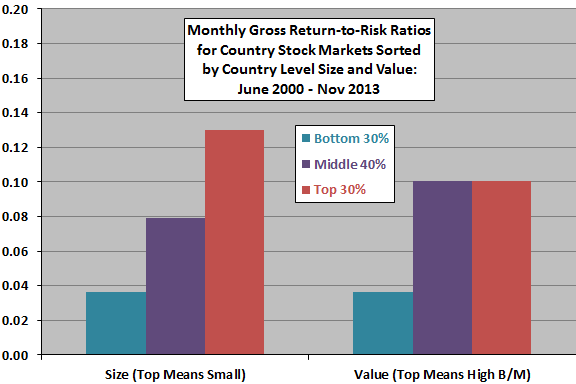Do country stock markets exhibit useful aggregate value and size metrics? In his December 2013 paper entitled “Macro Model for Macro Funds”, Adam Zaremba investigates whether macro size and value factors for country stock markets predict country stock index returns. Specifically, he calculates size and value factors at the country level in each of 66 countries. The size factor is the market capitalization of all listed firms in a country index. The value factor is the book-to-market value ratio (B/M) of all firms in a country index aggregated according to the index weighting methodology. He uses both MSCI country indexes and extant local country indexes to measure country market returns. He tests relationships between country-level size and value factors and future returns by each month separately constructing portfolios of the equally weighted top 30%, middle 40% and bottom 30% of country markets based on aggregate size and value factors. He also measures the performance of fully collateralized portfolios that are each month long (short) the equally weighted top (bottom) 30% of country markets based on aggregate size and value factors separately. To test sensitivity to the currency used, he performs all calculations separately in U.S. dollars, euros and yen. Using monthly accounting and return data as specified during June 2000 through November 2013, he finds that:
- Aggregate size and value factors explain differences in country stock index gross monthly returns (see the chart below).
- Country markets with the smallest aggregate capitalizations generate higher average gross monthly returns than those with the largest, and risk (volatility) does not account for the difference.
- Country markets with the highest aggregate B/M ratio generate higher average gross monthly returns than those with the lowest, and risk does not account for the difference.
- Similarly, hedge portfolios that are long (short) small or high-B/M (large or low-B/M) country markets generate positive average gross monthly returns.
- A three-factor model based on country-level size and value factors is two to three times better at explaining the variation in gross country market monthly returns than a three-factor model based on stock-level size and value factors.
- Results are similar whether calculated in dollars, euros or yen.
The following chart, constructed from data in the paper, summarizes monthly gross return-to-risk ratios for country stock markets sorted separately by aggregate value and size factors over the sample period. The return for each country is that of its MSCI index. The risk measure is standard deviation of monthly returns. Top (bottom) size means small (large) market capitalization. Top (bottom) value means high (low) B/M. For both aggregate metrics, top stock markets outperform bottom stock markets.

In summary, recent evidence indicates that size and value factors that explain variation in individual stock performance also explain in aggregate forms variation in country stock market performance.
Cautions regarding findings include:
- Return calculations are gross, not net. Including the costs of monthly portfolio reformation would reduce reported returns.
- Use of country indexes rather than tradable assets ignores the costs of maintaining liquid tracking funds. These costs may vary by country.
- Hedge portfolio calculations ignore costs of shorting country indexes.
- The sample period, limited by data availability, is short for testing annual book value. It is very short in terms of variety of worldwide economic conditions.
- Calculating metrics at the country market level is infeasible for most investors.